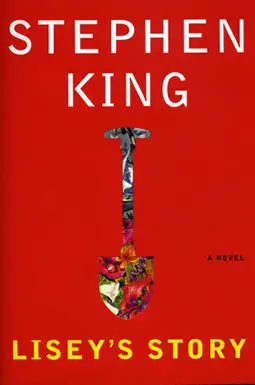Any self-proclaimed fan of the horror genre is familiar with the name Stephen King. Recently, the newest film adaptation of King’s novel “It” has swept through movie theaters in a firestorm of success. While King’s claim to fame has been achieved by climbing the rungs of the horror ladder, there is still much to be said about his softer, more sentimental side. (Shocking, but it does exist.) “Lisey’s Story” and “Joyland” showcase King’s lesser-known ability to evoke a feeling other than terror from his readers. Sure, watching King flex his horror muscles is always a trip, but his tamer side is definitely worth checking out.
1. Love Beyond the Grave
“Lisey’s Story” is a testament to King’s ability to fuse genres that are seemingly polar opposites. The novel takes form in equal parts psychological thriller and intense, sometimes excessive, intimacy. Lisey, the main character and central focus of the novel, is living in her novelist-husband’s post-death years (perhaps a morbid reference to yourself, Mr. King?).
While elements of King’s horror roots are present throughout the novel, what’s more interesting to analyze is the ways in which the characters present a real and transparent romantic relationship. Before their marriage, Scott revealed to Lisey that there was a dark place that he was drawn to, called Boo’ya Moon, that wielded enormous power over him. Boo’ya Moon also served as a source that Scott drew inspiration from for his wildly popular novels. Scott’s willingness to share this dark fragment of his life with Lisey reveals an element of deep-rooted trust within their relationship. Trust between Scott and Lisey is a quality that King utilizes frequently to portray the bond between the two characters. After Scott’s death, Lisey takes her own harrowing trip into Boo’ya Moon. While the journey itself is eye-opening, Scott’s voice serving as Lisey’s conscience and guide are what grabs the reader’s attention. When Lisey is questioning herself or her next step in the novel, Scott’s ethereal voice appears in her head, allowing her to successfully conquer whatever is in her way. By creating the novel in such a fashion, King is illuminating the powerful connection shared between the lovers, even in death.

People who have spent enough time in a relationship can eventually develop their own ways of communicating, ranging from pet names to entirely secret languages. In “Lisey’s Story,” a prominent element of the novel is concerned with the secret language of love that Scott and Lisey have fabricated. Phrases such as “everything the same,” meaning they were both okay; and “strap one on, babyluv,” a bracing phrase. These phrases appear frequently in the novel and are reflective of the ways in which Scott and Lisey are very much in tune with one another.
“Lisey’s Story” stands in stark contrast with other works of King, such as “It” and “The Stand,” because the story largely deviates from King’s horror playground and weaves a tale that shows just how deep the roots of love can go. It’s important to note that King, perhaps unable to resist, lets his penchant for penning horror plot lines emerge just a bit. All the same, “Lisey’s Story” packs an emotional punch that will make even the most hardened King fan go “aww.”
2. A Coming-of-age Story, King Style
Where can you go if you’re looking for fried food, popcorn, sketchy rides and cotton candy? Ask Devin Jones, the main character of “Joyland.” He would be more than ready to explain the perks of spending the summer working in an amusement park. Well, he might leave out the part about the gruesome murder that took place on Joyland’s very own ride called the “Horror House” (a perfectly suitable name, if you ask me.) “Joyland,” while exuding elements of a classic King horror story, presents to the reader a very personal and all too relatable coming-of-age tale. Jones, coming off a recent heartbreak, immerses himself in the unfamiliar world of carnies in the form of a summer job at an amusement park.
During his time there, Jones not only learns how to operate some classic carnival rides and how to navigate the Talk (the language used by carnies), but he also learns some staple life lessons: maneuvering a broken heart, enduring life’s cruelty’s and solving an outdated murder (okay, maybe not all are essential life lessons). Sidelining the element of horror allows us to analyze another aspect of “Joyland” that serves as Jones’ biggest source of personal growth: feeling the full effect of life’s ability to be one unfair SOB. While working in Joyland, Jones meets Annie and her son Michael, and the duo eventually become close companions of Jones. Michael, who is ten years old but as wise as they come, reveals to Jones that he has a rare form of muscular dystrophy that is typically an early death sentence. King, by way of Annie and Jones, creates characters who exude unconditional compassion. King uses Annie’s character to detail the heartbreaking experience of a mother who is caring for a child that is living on borrowed time. Jones, by watching the two, learns the hard and fast rule that love and loss are two elements in life that seem to come as a packaged deal.

During the medical madness, Jones also deals with the everyday twinges that come along with the ride on the fast-paced track into young adulthood: potential career and college choices and reevaluations of entire life plans. The small struggles that Jones battles with over the course of the novel are something that readers can sympathize with. Most college-age readers can agree, there is, at some point in an academic career, a moment of “what the hell am I gonna’ do next?” Jones’ character perfectly encapsulates the self-doubt and fear of the future that young adults feel as they transition from college into the big, bad real world.
Readers will find themselves relating to Devin Jones to the nth degree as he navigates his own breed of growing pains. Although, it would be off the mark and quite unlike King if there wasn’t a spooky element in the novel that was compounding all the other issues occurring. As if Jones doesn’t have enough on his plate, he also spends a large portion of his summer trying to solve a murder that happened many years prior to his arrival at Joyland. If you want to find out if Jones’ is a successful super sleuth, you’re going to have to crack the spine of King’s own version of a bildungsroman and dive into the world of cotton candy and homicide for yourself. “Joyland” will have readers feeling as if they’ve stepped back in time to their former, unsure adolescent days. We all had our fair share of growing pains, so it’s safe to say that a little bit of Devin Jones lives in all of us.

















